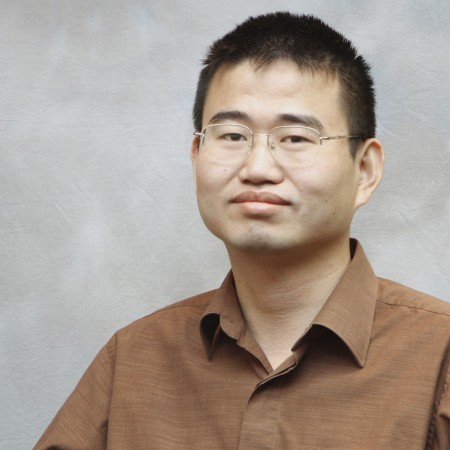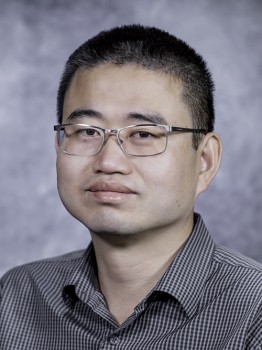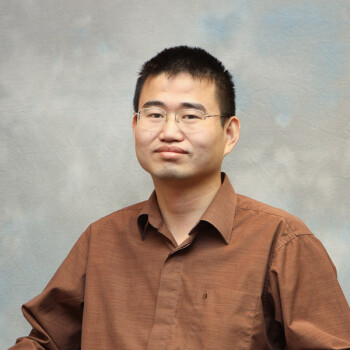Ph.D. - Physics
The University of Texas at Austin - 2005

Chuanwei Zhang
Research Professor - Physics
Professor, Washington University in St. Louis
Professional Preparation
B.S. - Physics
University of Science and Technology of China - 2000
University of Science and Technology of China - 2000
Research Areas
Research Interests
- Ultra-cold Atomic Gases
- Topological Superfluid and Superconductor
- Physical Implementation of Quantum Information and Quantum Computation
- 2D materials
Publications
Spin Current Generation and Relaxation in a Quenched Spin-Orbit Coupled Bose-Einstein Condensate,Chuan-Hsun Li, Chunlei Qu, Robert J. Niffenegger, Su-Ju Wang, Mingyuan He, David B. Blasing, Abraham Olson, Chris H. Greene, Yuli Lyanda-Geller, Qi Zhou, Chuanwei Zhang, Yong P. Chen, Nature Communications 10, 375 (2019). 2019 - Publication
Experimental realization of a non-magnetic one-way spin switch, M. E. Mossman, Junpeng Hou, Xi-Wang Luo, Chuanwei Zhang, P. Engels, Nature Communications 10, 3381 (2019). 2019 - Publication
Majorana corner modes with solitons in an attractive Hubbard-Hofstadter model of cold atom optical lattices, Chuanchang Zeng, T. D. Stanescu, Chuanwei Zhang, V. W. Scarola, Sumanta Tewari, Phys. Rev. Lett. 123, 060402 (2019) 2019 - publications
Majorana Doublets, Flat Bands, and Dirac Nodes in s-Wave SuperfluidsHaiping Hu, Fan Zhang, Chuanwei Zhang, Phys. Rev. Lett. 121, 185302 (2018). 2018 - Publication
Magnetic Control of Valley Pseudospin in Monolayer WSe2, Grant Aivazian, Zhirui Gong, Aaron M Jones, Rui-Lin Chu, Jiaqiang Yan, David G Mandrus, Chuanwei Zhang, David Cobden, Wang Yao, Xiaodong Xu, Nature Physics, 11, 148 (2015). 2015 - Publication
Dicke-type phase transition in a spin-orbit coupled Bose-Einstein condensate Chris Hamner, Chunlei Qu, Yongping Zhang, JiaJia Chang, Ming Gong, Chuanwei Zhang, and Peter Engels, Nature Communications 5, 4023 (2014). 2014 - Publication
Statistical properties of exciton fine structure splitting and polarization angles in quantum dot ensembles Ming Gong, B. Hofer, E. Zallo, R. Trotta, Junwei Luo, O. G. Schmidt, Chuanwei Zhang, Phys. Rev. B 89, 205312 (2014) 2014 - Publication
Emergent Kinetics and Fractionally Charged Excitations in 1D Spin-Orbit Coupled Flat Band Optical Lattices Fei Lin, Chuanwei Zhang, V. W. Scarola, Phys. Rev. Lett. 112, 110404 (2014) 2014 - Publication
Awards
Fellow - American Physical Society [2017]
Robert S. Hyer Awards - American Physical Society Texas Section [2015]
Young Faculty Award - Defense Advanced Research Projects Agency [2010]
Appointments
Professor
The University of Texas at Dallas [2016–Present]
The University of Texas at Dallas [2016–Present]
Associate Professor
The University of Texas at Dallas [2012–2016]
The University of Texas at Dallas [2012–2016]
Assistant Professor
Washington State University [2008–2012]
Washington State University [2008–2012]
Postdoctoral Research Associate
The University of Maryland [2006–2008]
The University of Maryland [2006–2008]
Additional Information
Personal website
https://www.utdallas.edu/~chuanwei.zhang/News Articles
Physics Professor Named APS Fellow for Ultracold Physics
 Dr. Chuanwei Zhang, professor of physics in the School of Natural Sciences and Mathematics, was named fellow of the American Physical Society (APS) in October.
Dr. Chuanwei Zhang, professor of physics in the School of Natural Sciences and Mathematics, was named fellow of the American Physical Society (APS) in October.ws are elected based on their exceptional contributions to physics. Zhang was cited for “seminal contributions to theoretical research in ultracold atomic physics, including studies of spin-orbit coupled quantum gases, topological superfluids with Majorana or Weyl fermions, and Fulde-Ferrell superfluid states.”
Physicist's Theories, Project Provide Big Insights to Quantum Work
Theories developed by a UT Dallas physicist have been put to the test in the laboratory, and the results offer a new way to study — and possibly exploit — the strange realm of quantum physics.In a study published in June in the journal Nature Communications, Dr. Chuanwei Zhang, associate professor of physics at UT Dallas, and researchers at Washington State University collaborated on a project aimed at gaining a better understanding of the physics that governs the invisible micro-world of atoms and particles.
Big Ideas Drive Science of the Ultra-Small and Ultra-Cold
For most people, the technical aspects of quantum physics – the behavior of matter and energy on scales as small as an atom or an electron – are enough to make their eyes glaze over.But the emerging scientific field of quantum topological materials might be as easy to visualize as a glazed doughnut.
“In this field of research, we are trying to find new materials that are, from a physics standpoint, protected by their topology,” explained Dr. Chuanwei Zhang, associate professor of physics at The University of Texas at Dallas. He is one of the organizers of a scientific conference on the topology of quantum matter to be held on campus this month.
Dr. Chuanwei Zhang Receives $640,000 Grant from US Air Force
 Dr. Chuanwei Zhang received $640,087 from the Air Force Office of Scientific Research for his research on Quantum Simulation, Computation, and Metrology with Ultracold Atoms. Dr. Zhang’s goal is to foster the development of quantum technologies with ultracold atoms by envisioning new device concepts, developing controlling tools, and designing quantum matter with desired properties.
Dr. Chuanwei Zhang received $640,087 from the Air Force Office of Scientific Research for his research on Quantum Simulation, Computation, and Metrology with Ultracold Atoms. Dr. Zhang’s goal is to foster the development of quantum technologies with ultracold atoms by envisioning new device concepts, developing controlling tools, and designing quantum matter with desired properties.